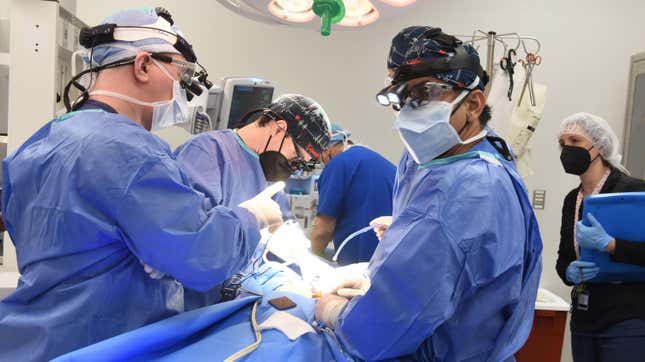
A 57-year-old man is recovering in a Maryland hospital after receiving a genetically modified pig’s heart, in what is a groundbreaking medical achievement.
“It was either die or do this transplant. I want to live,” said organ recipient David Bennett a day before the surgery, which was performed on January 7 at the Maryland Medical Center. “I know it’s a shot in the dark, but it’s my last choice.”

Bennett, due to his life-threatening arrhythmia, was deemed ineligible for the conventional transplant list or for an artificial heart pump, according to a University of Maryland Medical Center press release. Diagnosed with a terminal heart disease, he had been hospitalized and bedridden for months.
On New Year’s Eve, the U.S. Food and Drug Administration, through its compassionate use provision, granted authorization for the emergency procedure, as it was deemed the only viable option to keep Bennett alive. Doctors advised their patient of the associated risks, and Bennett decided to go through with the procedure.
Bennett is now recovering from the operation and doing well, according to University of Maryland Medicine. Doctors will keep a close eye on him in the coming days and weeks, looking for signs of rejection or infection. Should all continue to go well, Bennett will be disconnected from a heart-lung bypass machine.
For now, this radical procedure will serve as a one-off, but it has set an important medical precedent. The operation shows that it’s possible for a genetically modified pig heart to take the place of, and function similarly to, a human heart, and not be rejected by the body (at least so far). The experimental technique represents a potential solution for easing the organ shortage crisis. Approximately 106,000 Americans currently need an organ transplant, of which nearly 6%, or 6,200, will die while waiting, according to statistics provided by the federal government.
“There are simply not enough donor human hearts available to meet the long list of potential recipients,” Bartley Griffith, the UMSOM surgeon who transplanted the pig heart, said in the press release. “We are proceeding cautiously, but we are also optimistic that this first-in-the-world surgery will provide an important new option for patients in the future.”
An operation like this obviously doesn’t happen overnight. Five years ago, Griffith, along with Muhammad Mohiuddin, a professor of surgery at UMSOM, founded the Cardiac Xenotransplantation Program, in which researchers examine the “use of genetically engineered animal organs for human transplantation.” The experimental procedure “is the culmination of years of highly complicated research to hone this technique in animals with survival times that have reached beyond nine months,” said Mohiuddin in the University of Maryland release.
Regenerative medicine company Revivicor provided the xenotransplantation lab with the genetically modified pig. Pigs get a lot of attention in xenotransplantation research due to their physiological similarities to humans and nonhuman primates. In October 2021, Revivicor provided a pig kidney for transplant into a person who was brain dead, in what was another groundbreaking medical procedure, though one that did not save the patient’s life.
A total of 10 genetic modifications were made to the pig: three genes were knocked out to prevent rejection, six human genes were introduced to coax acceptance of the organ, and one gene was added to prevent the excessive growth of heart tissue. The heart, after being removed from the pig, was sustained in a newly developed machine—a perfusion device known as the XVIVO Heart Box. The team also tested a new drug to suppress the patient’s immune system and prevent rejection.
The use of animal parts to treat heart conditions is hardly new. Pig heart valves have been used for many years to replace valves in humans. And back in the 1980s, a baby diagnosed with a fatal heart condition was given a baboon’s heart. The patient, known as Baby Fae, died a month later after her body rejected the organ.
More: Surgeons in New York Successfully Transplant Pig Kidneys to Two People